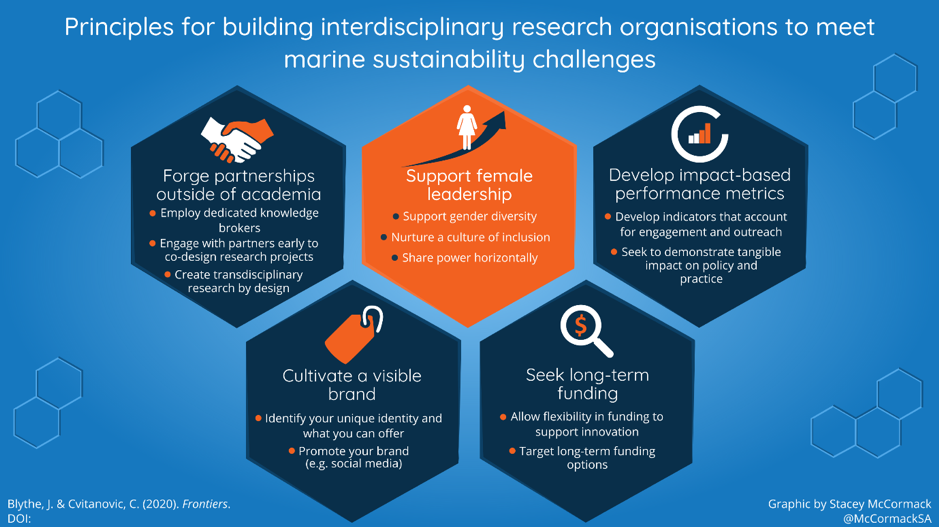Jessica Blythe and Chris Cvitanovic
Background
The unique challenges presented by the Anthropocene to marine socio-ecological systems necessitate new approaches of knowledge production that are capable of integrating scientific disciplines to develop solutions that are desirable, equitable, and viable. Despite increasing rhetorical support for interdisciplinary marine research, however, significant challenges associated with doing interdisciplinary research persist, and undermine progress towards tackling and navigating the complex challenges faced by marine social-ecological systems. While a growing body of literature has sought to identify strategies for overcoming the documented barriers to building capacity for interdisciplinary research at the individual level, there is very little empirically derived guidance for how to build institutional capacity and structures that support interdisciplinary research, particularly for research organizations focused on developing solutions to marine sustainability challenges. To address this gap, in our new open access study published in Frontiers in Marine Science, we undertake an in-depth evaluation of the Centre for Marine Socioecology (from herein CMS) in Tasmania, Australia, which brings together disciplinary expertise in physics, law, economics, biology, sociology and governance to solve the grand challenges facing the worlds coastal and marine environments. We elucidated the key perspectives of CMS members across all disciplines and career stages (PhD students, postdoctoral researchers, mid-level and senior academics, and the leadership team) and in doing so identified five key organizational features that enable successful interdisciplinary marine research (Figure 1).

Figure 1: Five organizational features that enable successful interdisciplinary marine research, as published in “Blythe and Cvitanovic (2020)”.
Five organizational features
- Support female leadership: The first of our five principles highlights the importance of supporting female leadership across all organizational levels, from centre directors to project and research group leaders. Our analysis suggest that when females are supported to both attain, and to be successful in, leadership positions, it can benefit the broader organisation by: (i) encouraging innovation and creativity, (ii) cultivating a more inclusive research environment, and (iii) removing hierarchical power imbalances that have the potential to derail collaboration among researchers from different disciplines.
- Forge partnerships outside of academia: The second principle highlights the importance of forging partnerships outside of universities. Our results suggest that when academics collaborate with actors from outside of academia (for example, with policy makers or industry representatives), both the quality of the scientific outputs, as well as their relevance to decision-makers, increased. Our results identified two specific strategies that participants of our study feel can be mainstreamed within interdisciplinary research organizations to help forge partnerships outside of academia. The first is the implementation of knowledge co-production processes, and the second is the use of science-policy boundary-spanners, such as knowledge brokers.
- Develop-impact-based metrics: The third principle identified through our analysis is the need to develop impact-based performance metrics. Impact in this context refers to research influence that extends outside the academy to achieve “an effect on, change or benefit to the economy, society, culture, public policy or services, health, the environment or quality of life”. This is separate from the notion of academic impact, which describes the intellectual contribution of an individual (or group of individuals) to a particular field of study and is typically measured through metrics associated with publication rates, citations rates and other indices such as the h-index. This distinction is important for interdisciplinary research organisations that are explicitly oriented towards the identification of socially relevant solutions to complex social-ecological challenges. Thus, their central objective is not simply the pursuit of knowledge, but rather the pursuit of knowledge that informs how societies navigate associated with complex challenges such as climate change, biodiversity loss, water scarcity, and food insecurity.
- Seek long-term funding: The fourth principle highlights the need to secure long-term funding to support successful interdisciplinary research. Funding plays a pivotal role in enabling academics to undertake high-quality research in all fields and disciplines, supporting a range of research items and activities, including field and laboratory costs, the salaries of PhDs and postdoctoral researchers, training and partnerships. We found, however, that the importance of long-term funding (e.g., >5 years) is even more important within interdisciplinary research settings given the additional time required, and associated transactional costs, to build meaningful relationships founded upon mutual respect and trust among research team member.
- Cultivate a visible brand: The fifth and final principle that emerged from our analysis is the potential power of effective branding for supporting interdisciplinary research organisations. In this context, branding refers to the development of a unique name, design, and ethos that identifies and differentiates an organization. For example, research organisations can leverage a visible brand to establish their credibility, which in this context, refers to perceptions about the high accuracy, validity, and quality of research outputs. Previous studies have also shown how institutional credibility can increase the uptake of research findings into policy and practice.
Concluding remarks
In the context of the Anthropocene, interdisciplinary research is essential for identifying innovative solutions to the challenges facing marine socio-ecological systems. Despite broad consensus regarding the imperative for interdisciplinary approaches to inquiry, empirical evidence on how we can best build institutional capacity for interdisciplinary research is still lacking. Through in-depth, qualitative research our study has sought to begin to fill this gap. Future engagement with these five principles, including exploration of how they translate across contexts, scales, and geographies, will be critical for building the interdisciplinary research capacity that is required to tackle our most pressing scientific and societal questions.
